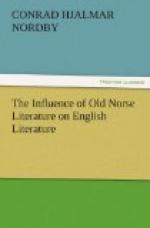. . . . . . . . . . . . .
Our wisdom and valour have kissed,
and thine eyes shall see the fruit,
And the joy for his days that shall be hath pierced
my heart to the
root.
(P. 62.)
It appears from this study of Book I that Sigurd the Volsung has adapted the saga story to our civilization and our art, holding to the best of the old and supplementing it by new that is ever in keeping with the old. Other instances of this eclectic habit may be seen in the other three books, but we shall quote from these for other purposes.
Book II is entitled “Regin.” “Now this is the first book of the life and death of Sigurd the Volsung, and therein is told of the birth of him, and of his dealings with Regin the Master of Masters, and of his deeds in the waste places of the earth.”
Morris was deeply read in Old Norse literature, and out of his stores of knowledge he brought vivifying details for this poem. Such, for instance, is the description of Sigurd’s eyes, not found just here in the saga:
In the bed there lieth a man-child,
and his eyes look straight on
the sun.
. . . . . . . . . . . . .
Yet they shrank in their rejoicing before the eyes of the child.
. . . . . . . . . . . . .
In the naming of the child by an ancient name, the meaning of that name is indicated:
O Sigurd, Son of the Volsungs, O Victory yet to be!
The festivities over the birth of the child are wonderfully described in the brief lines, and they are a picture out of another book than the saga:
Earls think of marvellous stories,
and along the golden strings
Flit words of banded brethren and names of war-fain
Kings.
Over and over again in this poem Morris records the Icelanders’ desire “to leave a tale to tell,” and here are Sigurd’s words to Regin who has been egging him on to deeds:
Yet I know that the world is wide,
and filled with deeds unwrought;
And for e’en such work was I fashioned,
lest the songcraft come to
nought,
When the harps of God-home tinkle, and the Gods
are at stretch to
hearken:
Lest the hosts of the Gods be scanty when their
day hath begun to
darken.
(P. 82.)
In Book II we have other great speeches that the poet has put into the mouth of his characters with little or no justification in the original saga. Chap. XIV of the saga contains Regin’s tale of his brothers, and of the gold called “Andvari’s Hoard,” and that tale is severely brief and plain. The account in the poem is expanded greatly, and the conception of Regin materially altered. In the saga he was not the discontented youngest son of his father, prone to talk of his woes and to lament his lot. In the poem he does this in so eloquent a fashion that almost we are persuaded to sympathize




